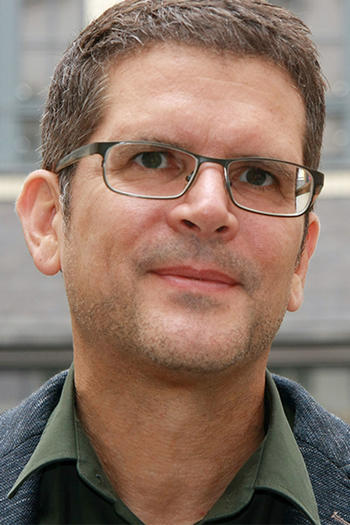“The coronavirus pandemic is a mirror of globalization and the inequalities it has produced”
Campus.leben series: “Coronavirus – Ask the Experts” / Part 4: Interview with the social and cultural anthropologist Hansjörg Dilger from Freie Universität Berlin
Apr 16, 2020
How is society reacting to the coronavirus crisis? In part four of our series, we spoke with Professor of Social and Cultural Anthropology Hansjörg Dilger.
Image Credit: shutterstock.com/khaleddesigner
What changes has the coronavirus pandemic brought about? How has it influenced the lives of individuals? What impact is it having on society, politics, the economy, research, and culture? In the latest interview in the campus.leben series “Coronavirus – Ask the Experts,” Hansjörg Dilger, a professor of social and cultural anthropology at Freie Universität Berlin, discusses what the Global North can learn from the Global South and the disparities between them in terms of preparedness for the pandemic. The global community will be measured in the future by how we live out ethical and humanitarian principles during the crisis – both within individual societies and globally, says the medical anthropologist.
Professor Dilger, how prepared is Germany for a crisis like the one the coronavirus pandemic has created? Or to put it another way: How does a society like ours – which has little experience with natural catastrophes and seems to take for granted things like freedom, prosperity, and other cultural achievements – respond to a situation like this?
“Anthropologists often note that the future of globalization – including its dark side – is already a part of the lived social realities in the Global South,” says Hansjörg Dilger.
Image Credit: Marisa Maza
The current situation in Germany would hardly have been imaginable even just a few weeks ago. Experts have repeatedly warned the public about a global pandemic. But here in Germany, SARS, Ebola, H5N1 (“avian flu”), and H1N1 (“swine flu”) were all considered diseases affecting “others” in the Global South. The coronavirus is showing us that the Global North has not been ready for something like this. Our society has become vulnerable to an extent and at a speed that it did not realistically consider to be possible.
What factors actually determine how a society reacts to a crisis?
It comes down to what sort of experience specific countries and societies have had with comparable epidemic crises in the recent past, the kind of government they have, and the resources they have available to combat the crisis. In 2002/2003, the SARS epidemic in Asia also started in China and was dealt with to some extent using authoritarian measures. The social and global effects that people were afraid of back then did not manifest in the long run – but the region did develop an awareness that an epidemic like that could happen again, and they established forms of regional cooperation.
The current pandemic spread to Europe very quickly, and the number of cases rose sharply, especially in Italy and Spain. At the same time, European austerity policies in these countries, following the financial crisis of 2008/2009, have led to drastic cuts in the public financing of health-care systems and put a burden on citizens that has continued to grow over time. After some hesitation at the outset, these countries have now implemented drastic measures, which are being enforced by the police and drone surveillance in Spain for example.
In comparison, Germany was better prepared – even though we have also seen our share of privatization and cuts in public financing in the nursing and health-care sectors in recent years.
What do you make of the political and social discourse taking place in Germany right now?
The striking thing about current debates is that they tend to be directed inward when it comes to questions of public health as well as social critique. This seems completely appropriate when it comes to restrictions to basic freedoms or the circumstances in which people from highly vulnerable social groups find themselves.
At the same time, we should be talking much more about international and global solidarity and upholding humanitarian principles. This has implications for cohesion within Europe as well as for the intolerable situation of the refugees at the European Union’s borders; in African countries, the coronavirus pandemic will hit the most vulnerable social groups with a severity that is partly due to the global economic order.
The fact that protecting lives has – so far! – been unquestionably placed above economic concerns for the most part is absolutely right. At the same time, economic priorities have always put socially vulnerable groups at a disadvantage. This situation, too, calls for a critical debate about the consequences of late capitalism in the context of globalization.
Can German society learn something from other countries that have to deal with natural catastrophes or epidemics on a regular basis? Usually, it is Germany that provides aid to newly industrialized countries – could the roles be reversed in this case?
Based on my research in eastern Africa, I know that societies there tend to be more flexible when it comes to handling a crisis. Through neoliberal structural reforms, they have become accustomed to the fact that the state will not be able to resolve the crisis for them and are aware that authoritarian measures hit vulnerable groups the hardest. For example, in the context of HIV/AIDS, there were ruptures in familial and social structures; people who were sick or dying would just be left alone.
At the same time, people also developed many small-scale support projects – on a community level, through churches or NGOs. In the context of the coronavirus pandemic, they will also have to rely on mutual solidarity to overcome the crisis; governmental measures are often insufficient and have particularly harsh consequences for socially vulnerable groups.
The need to demonstrate solidarity in everyday life is something that Germany could indeed learn from these countries – and we are already seeing numerous support projects taking shape here both on an individual and on a societal level.
I have no doubt that the Global North can also learn from the Global South’s models and experiences of how to overcome a pandemic. Anthropologists often note that the future of globalization – including its dark side – is already a part of life in the Global South.
A crisis like this one with the coronavirus can, therefore, also provide an opportunity. It is an opportunity for partnerships to form in the area of global health – but also other political partnerships in general – that can go beyond models of cooperation that still to this day rely on postcolonial hierarchies of “aid” and dependency. However, let me be explicit here: That does not mean that everything these countries with more experience have done can or should be applied directly to the situation in Germany.
Based on your work, are you able to provide any recommendations for the current situation?
This crisis is going to leave a lasting mark on Germany. Along with the personal and economic consequences, it will also influence our awareness that the negative effects of globalization can take their toll on us directly and to a degree we have not known until now. I hope that this awareness leads to a long-term shift in thinking about the current social and world order.
What might that look like?
The coronavirus pandemic is a mirror of globalization and the inequalities it has produced. The consequences of the coronavirus pandemic cannot simply be that a few people’s salaries have to be slightly adjusted, and we are all made to become more flexible employees who can work remotely from home and thus provide cheaper labor. Right now is the time to discuss topics like climate protection, how to control neoliberal economic activity, or a sustainable reform of the health-care system.
In general, I consider solidarity to be a fundamental value in the current situation. Whether in the short term or medium term, epidemics always affect those who are socially the most vulnerable. In the case of the coronavirus, that means, within a given society, the homeless, refugees, and people living in structurally disadvantaged situations, in addition to those who are most at risk from a medical perspective. On an international and global scale, that means countries and societies that have been hit hardest by the negative effects of economic globalization.
Upholding ethical and humanitarian principles – and actually living by them – in crisis situations is something that will define us as a society and a global community for many years to come.
Christine Boldt conducted the interview.
The original German version of this article was published on April 2, 2020, in campus.leben, the online magazine of Freie Universität Berlin.
Further Information
Read all the interviews in the campus.leben series “Coronavirus – Ask the Experts”:
- Interview with Claudia Müller-Birn: “How should we design the tracing app so that people want to use it?”
- Interview with Tanja Börzel: “The European Union has proven its resilience in times of crisis”
- Interview with Professor Eun-Jeung Lee: “Many countries are now trying to learn from the Korean experience”
- Interview with Professor Joachim Trebbe: “We are communicating more than usual in bubbles”
- Interview with Stefan Gosepath: How Just is Our Society in Times of Crisis?
- Interview with Carolin Auschra: “Organizations and systems often change in times of great crisis”
- Interview with Professor Hansjörg Dilger: “The coronavirus pandemic is a mirror of globalization and the inequalities it has produced”
- Interview with Professor Lars Gerhold and Roman Peperhove: “Everyone is potentially affected, but everyone can also do something”
- Interview with Paul Nolte: “We are going to be working through this trauma for decades to come”
- Interview with Martin Voss: “If we choose to, we can lay the groundwork to shape the future”


